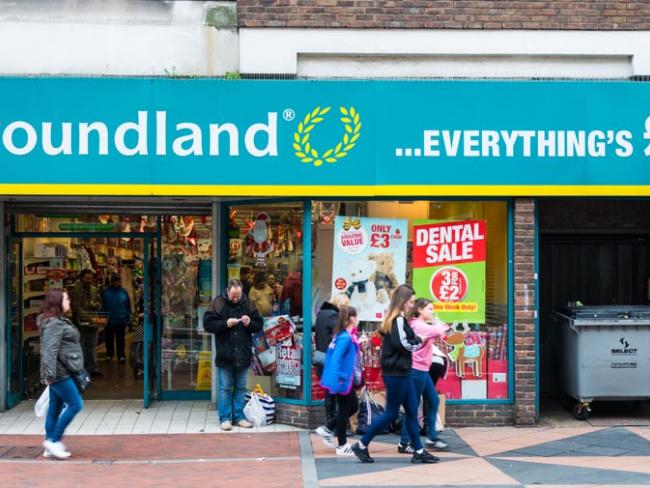20 February 2017

Poundland store in Reading – one of 500 Poundland stores in Britain. Photo mubus7/shutterstock.com.
New research on living standards shows that four million more people in Britain are living below an adequate standard of living, struggling to make ends meet – and are just about managing at best, according to an authoritative report by the independent Joseph Rowntree Foundation calculated by the Centre for Research in Social Policy at Loughborough University.
The growing risk of low income is not due to an increased risk of unemployment but affects huge numbers in employment. Almost three million working age households, six in 10 below MIS, have at least one person in work.
Since the 2008 financial crisis, Britain’s employment market has seen the rise of more people doing low-paid, self-employed jobs such as driving Ubers or delivering food for Deliveroo: the so-called “gig economy”. The irregular hours mean these workers are missing out on pay too.
The report sheds light on how different kinds of household are faring since the financial crisis against the Minimum Income Standard (MIS), which is a benchmark of income adequacy, as defined by what the public think is needed for a decent living standard. The situation could drastically worsen over the next few years as inflation spikes.
Tipping point
It warns that millions of just managing families are on the tipping point of falling into poverty as prices rise in the shops, with forecasts showing the cost of living could be 10 per cent higher by 2020.
Based on the latest available data from official statistics, between 2008/9 and 2014/5, the number of individuals below MIS rose by four million from 15 million to 19 million (from 25 to 30 per cent of the population).
Within that number 11 million people living far short of MIS, up from 9.1 million. These people have incomes below 75 per cent of the standard and are at high risk of being in poverty. The remaining eight million fall short of the minimum, by a smaller amount – and despite having a more modest risk of poverty, are just about managing.
Lone parents, even those working full time, have a 42 per cent risk of being below MIS, up from 28 per cent in 2008/09. In total 151,000 out of 356,000 people in households headed by lone parents working full time are below the minimum.
Among couples with children where there is only one breadwinner, 56 per cent – 500,000 out of 880,000 people – are living below MIS, a rise of more than a third over the six-year period. For couples with children where one adult works full time and the other is in part-time or self-employment, the risk of inadequate income has increased by a half, reaching 18 per cent – affecting 310,000 out of 1.7 million people in such families.
Fine margin
Families just about managing have been the focus of the Government’s efforts to support people on low incomes. But the Joseph Rowntree Foundation is warning there is a fine margin where just managing can quickly tip into poverty. The Foundation’s report is supported by Office for National Statistics data, which last year found that 33 per cent of people were in poverty at least once between 2010-13.
The increase in the numbers below MIS has been driven by rising costs while incomes stagnate. The price of a minimum “basket of goods” has risen between 27 and 30 per cent since 2008, and average earnings by only half that amount. And the cost of living may be 10 per cent higher by 2020.
That life is so precarious for so many families and people is an indictment of free-market capitalism. There is so much that needs to be done. We can’t afford to become a permanent food-bank society, dependent on degrading handouts and do-gooding charities. The costs of energy and housing need to be regulated. The low paid must organise in trade unions and fight for higher pay. Brexit must see government retrain and upgrade our people and rapidly develop industry employing better paid skilled workers. Industrialise our way out of growing poverty!
